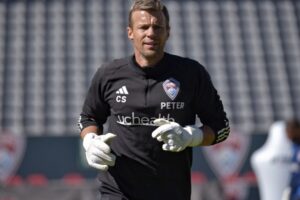AUSTIN – So much of Matt Besler’s soccer career appears to have been fated. From the color of the jerseys that will likely book-end his playing career, to his long association with his hometown club, Kansas City, to his almost gliding style of unruffled play, everything seems just-so in the former USMNT veterans story. Besler, though, admits to having to fight for all of it.
Man On: With Austin FC’s Matt Besler
The Kansan wasn’t sure he’d even make the cut as a professional soccer player. And he nearly missed making the cut for the 2014 World Cup. The same Matt Besler who went on to win both the MLS and Open Cup, made numerous MLS All-Star teams, was named Defender of the Year in 2012, and went on to register all-time records for Sporting Kansas City in games played, games started, and minutes played. And then, unexpectedly for all concerned, he transferred to Austin. Did anyone really think Besler wouldn’t go on to make a success of that move, too? Not those in the know.
LWOS: What’s your earliest memory of playing soccer?
Besler: So, I was in kindergarten. I was five or six years old and my parents signed me up to be on a team. They didn’t know much about the game at all. They both grew up in sports, but neither of them played soccer. The area that I grew up in (Overland, KS), it seemed like it was the popular thing to do to put your kid in soccer. So that’s really what all the parents did. I guess my earliest memory was my jersey. It was green. I was number seven. Our team was called the Green Machine. I guess the rest is history.
LWOS: You’ve been a pro for a lot of years and played the very highest levels. What are some of the biggest differences from when you got your first pro contract and what you see with young players coming into MLS today?
Besler: I can only speak for myself and my experience of what it was like when I first came into the league. I was in survival mode, meaning that I was not focused on being a starter or being an All-Star or a national team player, or playing in the World Cup. I was focused on just trying to make the team, working as hard as I could, and just try and be on the roster on the last day. And if they wanted to pay me to play soccer then, great, this is a pretty sweet gig so let’s try and make it last as long as possible. My goals really didn’t go beyond that because I wasn’t sure if I was gonna make it or not. It wasn’t until I had established myself, probably a few years into my career, that I finally felt comfortable enough to admit that, you know what, I am a professional soccer player and this is what I’m going to do for my career.
I would also say to from a soccer standpoint, technical ability, tactical ability, the younger players coming into the league now are miles ahead of where I was when I was their age. The kids are really, really good. Some of the stuff they’re able to do on the field, I wouldn’t have imagined myself being able to do. I think it says a lot about the development system. More and more kids are getting opportunities at a younger age. This age thing is really just a number. I don’t think it matters anymore if you’re 17 or if you’re 22 or if you’re 30, if you can play. So, you know these kids, I continue to be impressed with their talent level from a soccer perspective.
The one thing that is still missing is the psychological part of it. When I started in the league, the youngest players were 21 and 22 years old. There really wasn’t anybody that was coming into the league before that, aside from the one-offs like the Freddie Adu. Ninety-five percent of the players went to college and played in college all four years, so by the time they were getting into the league they were in their early twenties. There’s a big difference between a 17-year-old and a 22-year-old maturity-wise, psychological-wise. College is a very unique experience, and you do a lot of growing up in college. So, the challenge for US Soccer, who have done an incredible job of developing soccer players, is how can we start adding the total package, and helping these kids develop strong mentalities? It’s definitely an interesting piece.
LWOS: With you and your younger brother Nick (player for Real Salt Lake) both having professional soccer careers, what’s it like to be a soccer sibling?
Besler: It’s interesting for sure. Nick is six years younger than me so there’s quite an age gap. I still consider him to be my baby brother! We all played a lot of different sports growing up. My middle brother was an outstanding American Football player and basketball player in high school. But it’s been amazing to watch my youngest brother develop his own career. I would say that he’s probably had to work and grind harder than I did to make a career out of it. Witnessing that is sometimes more rewarding for me. He’s done a really good job of making himself valuable whatever team he’s been on. I think that’s one of the main reasons why he’s stuck around so long, and he’ll continue to do so.
LWOS: You were ‘Mr. Kansas City’ your entire career. After more than a decade with your hometown team, what was the most challenging part of moving on?
Besler: That I just I never envisioned it. I never envisioned playing for somebody other than Kansas City. So, when that happens, it’s hard to like wrap your mind around it. I love Kansas City, you know. I had some opportunities earlier in my career to possibly leave Kansas City and go play overseas, but for various reasons, I decided to stay in Kansas City. It was sort of my identity, the hometown guy, he’s never gonna leave, he’s loyal, that was part of who I was. Being forced to leave or choosing to leave, however you want to say it, it was tough exactly because I had chosen to do the opposite multiple times. So, that was probably the hardest part, just mentally opening myself up to the idea that it’s potentially going to happen – and it’s going to be okay. But as soon as I was able to accept that, which took a couple of weeks for me to mentally get myself to that point, it completely changed everything, and it was awesome! Then I actually really enjoyed the process. I think I’m a much better person and a much better player for leaving Kansas City, and I don’t have any regrets.
LWOS: You’ve had a glittering career so far, making nearly 50 appearances for the USMNT, playing in a World Cup, winning the Gold Cup twice, winning MLS Cup; what stands out to you as being the single best moment?
Besler: That’s impossible to answer! It’s too hard to pick just one! <agonizes for a few moments> I mean, I think when you win a championship, those are certainly at the top. When you win a championship you’re forever connected with that team. You’ll always go down in history as a champion for years to come, like when we (Kansas City) won the MLS Cup in 2013, and Gold Cup is the same way. So, I would say anytime that I got to lift a trophy, those moments are probably going to be at the top.
The World Cup is kind of like its own separate little piece. I feel like the World Cup is probably going to be one of those things that you gain a greater appreciation of as time goes on. It’s one of those things where I have kids now so every time the World Cup happens, I fully plan on diving into it with my family. Every time I watch the World Cup, I’ll be able to say. ‘I got to play in this!’ How cool is that?
LWOS: As a veteran pro, when you finally decide to call time on your playing career, what’s next for Matt Besler? Commentary, coaching, acting with Matthew McConaughey?
Besler: Well, you know, there’s been quite a few people that say that I appear to be a natural at the acting, but I will fully admit I did not feel like a natural when I was filming some of those videos! No, it’s a good question. I really haven’t gone that far to figure it out because, in my opinion, to be a professional soccer player you have to commit yourself almost 100%. 100% of your energy, your time, your thoughts, has to go towards being a professional soccer player because if you don’t, then somebody else is going to pass you and you’re going to lose your edge. So, to continue to play at such a high level for a long period of time you really can’t afford to start thinking about other things and going down different paths.
Obviously, once I’m done playing, though, I would love to stay involved in the game. I would love to coach but the schedule of coaching scares me if I’m being completely honest! I see how hard our coaches work and the hours that they put in and the travel schedule. It’s probably even more demanding than as a player, so that part is a little intimidating at first. Commentary, punditry, probably seems like the best and easiest job in the world, but I’ve heard from many people that it’s actually very difficult, so I have respect for that. But I’m excited and I’m definitely curious for myself to see what I’m going to get involved in. We’ll see…






